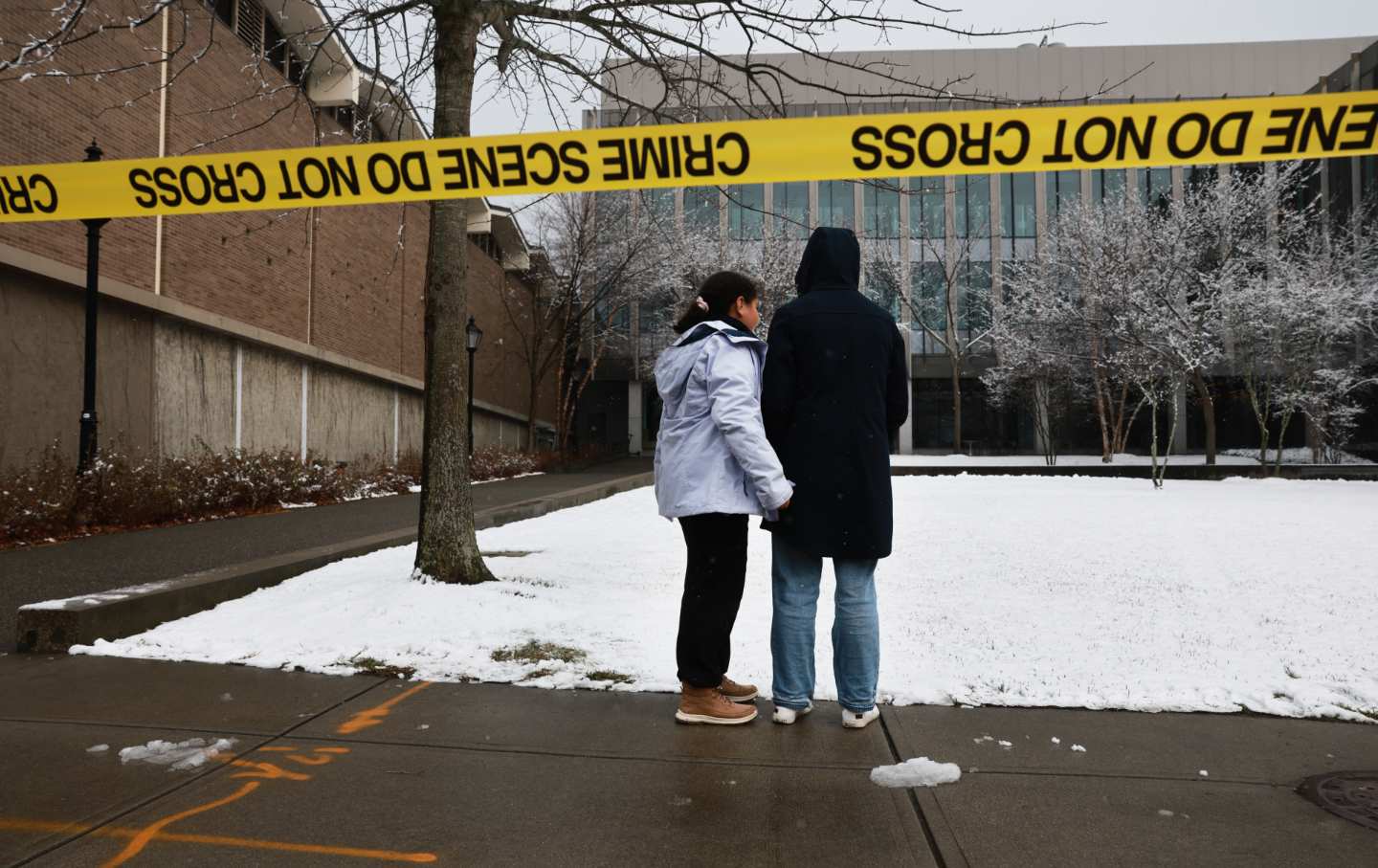The Humanitarian Pause Is a Chance to Pull Back From a Mindless War
The extended hostage exchange offers the opportunity to move from war to cease-fire to negotiations.

President Joe Biden, smarting from intense global criticism of his near uncritical support for Israel’s retaliatory assault on Gaza, wants credit for the current humanitarian pause that is allowing an exchange of hostages held by Hamas for prisoners held by Israel. In a statement on Monday, the president said, “I have remained deeply engaged over the last few days to ensure that this deal—brokered and sustained through extensive U.S. mediation and diplomacy—can continue to deliver results.”
It’s very difficult to praise Biden—especially since he’s resisted calls for a cease-fire. The push for prioritizing the release of the hostages came largely through political pressure from the families of Israeli hostages, who have been far more critical of Benjamin Netanyahu’s government than Biden has ever dared to be. But politicians are geared to responding to praise. if the path to peace requires giving Biden a pat on the back,, then one must grudgingly agree compliment him for this welcome development.
In truth, the humanitarian pause is just about the only good news to come out of Israel/Palestine since the current hostilities started with the Hamas massacre of October 7. We can all rejoice in the release of the Israeli hostages (whose capture was a war crime) and Palestinian prisoners (who were detained in a system that violates international law).
Even better news is that the parties involved in the negotiation are trying to build on it. As CNN reports:
Hamas is pushing to enact a clause in the original arrangement that would see extra days of pauses in Israeli strikes in return for the freeing of each group of 10 hostages. The Israeli cabinet has discussed the idea and Prime Minister Benjamin Netanyahu told Biden in a call Sunday an extension would be welcome, his office said in a statement. And the United States and Qatar—the two critical intermediaries in the deal—are seeking to use the momentum of the pause to create a foundation for a more permanent end to the fighting that could see more hostages freed and civilians shielded in Gaza.
It’s now possible for the first time since October 7 to imagine a path to a better future, one where the humanitarian pause extends to a full hostage release and lasting cease-fire, which in turn creates the conditions for a negotiated settlement (including Biden’s oft-stated goal since October 7 of resuming a push for a two-state solution). This scenario remains very unlikely—but it at least seems within the realm of possibility. It’s both a goal that activists can push for and a reasonable measurement that Biden can be judged against.
The humanitarian pause also offers Israel and the United States an opportunity to reflect on the fact that the military strategy Israel has pursued since October 7 is completely mindless: This has been a war of retribution against the civilian population of Gaza that makes no strategic sense and offers no path to genuine security for Israel (leaving aside the immense immorality of the slaughter). Some of the most devastating criticisms of Israel’s strategy have come not from the anti-war left but from the American national security establishment in respectable and staid institutions like the Rand Corporation (a think tank that serves the Pentagon) and publications like Foreign Affairs.
These critiques note that the October 7 attack was a massive intelligence failure that discredited existing Israeli strategy, which had assumed that the military threat of Hamas had been contained by a mixture of Iron Dome protection and diplomatic outreach to Arab autocrats (in the process of being codified in the Abraham Accords). Netanyahu’s government assumed the Palestinian question could be safely sidelined for the indefinite future. The atrocities of October 7 demonstrated the bankruptcy of this strategy.
Acting out of shock, Netanyahu’s government then reverted to the familiar tactic of proving its deterrence capability by unleashing the full fury of Israel’s military on Gaza. This is the strategy known as “mowing the lawn.”
Raphael S. Cohen, a director of strategy and doctrine at the Rand Corporation, offers this succinct account of “mowing the lawn”—which he calls “mowing the grass”:
Palestinians, frustrated by the state of the enclave, turn to the likes of Hamas for, if nothing else, vengeance against Israel; Israel imposes restrictions such as the blockade on Gaza, citing security concerns; living conditions in Gaza deteriorate further, and discontent builds; Hamas, Palestinian Islamic Jihad, and others capitalize on the discontent and attack Israel; and Israel responds by “mowing the grass”—killing the perpetrators along with some number of civilians, buying at best a few years of relative peace and fueling further long-term radicalization. And so the cycle continues ad infinitum.
Cohen adds that this strategy is based on “hubris” and has already been shown not to work:
Israel’s mowing-the-grass strategy finally failed spectacularly on October 7. The Hamas attack underscored just how little control Israel has over Gaza. It was not just an intelligence failure and an operational failure but also a more sweeping strategic failure. The core premise behind Israel’s entire approach was proved catastrophically wrong in one morning.
Writing in Foreign Affairs, Joost Hiltermann, a program director at the International Crisis Group, notes that Israel’s recent attack on Gaza has no good exit strategy. As Hiltermann observes, Israel
so far has produced only a military response—to be clear, a devastating one—without a discernible endgame. In its fury and its pain, Israel has struck out not just at Hamas but at the entire Gazan population as well. It may soon find that it is not only incapable of achieving its stated goal of destroying Hamas’s military capability and governance of Gaza but will also be stuck with reoccupying Gaza and ruling directly over its newly homeless, desperate, and very angry population.
Meanwhile, the cost of the civilian carnage in Gaza is increasingly becoming visible. The New York Times reported on Saturday, “While wartime death tolls will never be exact, experts say that even a conservative reading of the casualty figures reported from Gaza shows that the pace of death during Israel’s campaign has few precedents in this century. People are being killed in Gaza more quickly, they say, than in even the deadliest moments of U.S.-led attacks in Iraq, Syria and Afghanistan, which were themselves widely criticized by human rights groups.” The Times estimates that of the more than 14,000 people killed in Gaza, at least 69 percent (or 10,000 people) have been women and children. At this rate, achieving Israel’s stated goal of destroying the estimated 30,000 Hamas fighters would entail hundreds of thousands of civilian deaths—assuming that Hamas doesn’t recruit new members as a result of the killings.
Popular
“swipe left below to view more authors”Swipe →
Israeli officials, when speaking to Secretary of State Antony Blinken have compared what they are doing in Gaza to the atomic bombing of Hiroshima and Nagasaki. This, to be clear, is from people trying to justify their actions.
Writing in Foreign Affairs, Matt Duss and Nancy Okail, both at the Center for International Policy, have recommended ways the Biden administration can build on the humanitarian pause and jump-start negotiations for a two-state solution. Their suggestions are eminently sensible—but they would require a president far more willing to aggressively challenge Israel on issues like the settlements than Joe Biden has ever shown himself to be. Yet as improbable as negotiations might seem at the moment, what is the alternative?
Israel’s war is a humanitarian disaster and has no strategic logic behind it. America’s position in the world is sinking as a result of Biden’s “bear hug” strategy of acting as Netanyahu’s willing assistant. The humanitarian pause offers a rare chance for both Biden and Netanyahu to pull back from the brink. This is the moment more than ever for activists to ramp up the pressure—not just for a cease-fire but for a negotiated settlement.
Disobey authoritarians, support The Nation
Over the past year you’ve read Nation writers like Elie Mystal, Kaveh Akbar, John Nichols, Joan Walsh, Bryce Covert, Dave Zirin, Jeet Heer, Michael T. Klare, Katha Pollitt, Amy Littlefield, Gregg Gonsalves, and Sasha Abramsky take on the Trump family’s corruption, set the record straight about Robert F. Kennedy Jr.’s catastrophic Make America Healthy Again movement, survey the fallout and human cost of the DOGE wrecking ball, anticipate the Supreme Court’s dangerous antidemocratic rulings, and amplify successful tactics of resistance on the streets and in Congress.
We publish these stories because when members of our communities are being abducted, household debt is climbing, and AI data centers are causing water and electricity shortages, we have a duty as journalists to do all we can to inform the public.
In 2026, our aim is to do more than ever before—but we need your support to make that happen.
Through December 31, a generous donor will match all donations up to $75,000. That means that your contribution will be doubled, dollar for dollar. If we hit the full match, we’ll be starting 2026 with $150,000 to invest in the stories that impact real people’s lives—the kinds of stories that billionaire-owned, corporate-backed outlets aren’t covering.
With your support, our team will publish major stories that the president and his allies won’t want you to read. We’ll cover the emerging military-tech industrial complex and matters of war, peace, and surveillance, as well as the affordability crisis, hunger, housing, healthcare, the environment, attacks on reproductive rights, and much more. At the same time, we’ll imagine alternatives to Trumpian rule and uplift efforts to create a better world, here and now.
While your gift has twice the impact, I’m asking you to support The Nation with a donation today. You’ll empower the journalists, editors, and fact-checkers best equipped to hold this authoritarian administration to account.
I hope you won’t miss this moment—donate to The Nation today.
Onward,
Katrina vanden Heuvel
Editor and publisher, The Nation
More from Jeet Heer


The Shocking Confessions of Susie Wiles The Shocking Confessions of Susie Wiles
Trump’s chief of staff admits he’s lying about Venezuela—and a lot of other things.

Why Epstein’s Links to the CIA Are So Important Why Epstein’s Links to the CIA Are So Important
We won’t know the full truth about his crimes until the extent of his ties to US intelligence are clear.

In America, Mass Shooting Survivors Can Never Know Peace In America, Mass Shooting Survivors Can Never Know Peace
A growing number of US residents have lived through more than one massacre.

Corporate Democrats Are Foolishly Surrendering the AI Fight Corporate Democrats Are Foolishly Surrendering the AI Fight
Voters want the party to get tough on the industry. But Democratic leaders are following the money instead.

Sleepy Donald Snoozes, America Loses Sleepy Donald Snoozes, America Loses
It’s bedtime for Bozo—and you're paying the price.

The Revolt of the Republican Women The Revolt of the Republican Women
Speaker Mike Johnson’s sexism is fueling an unexpected uprising within the GOP caucus.


